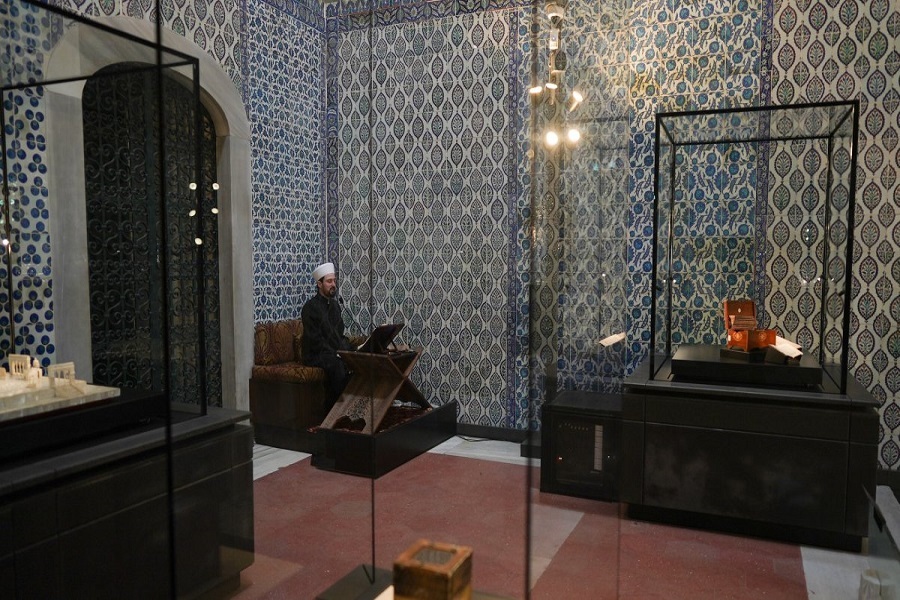Centuries-Old Quran Recitation Continues without Pause at Istanbul Palace

At Topkapı Palace’s Sacred Trusts Chamber, one of the most visited sections of the historic site, a unique tradition established during the reign of Ottoman Sultan Yavuz Sultan Selim continues uninterrupted for more than five centuries, a 24-hour, nonstop Quran recitation.
Located within the Enderun Courtyard of Topkapı Palace, the Sacred Trusts Chamber draws visitors year-round, who are welcomed by the constant sound of Quranic verses being recited. This longstanding practice symbolizes a perpetual vigil that has endured for approximately 500 years without pause.
The Quran is recited around the clock by 28 hafizes, who have memorized the entire Quran and rotate shifts in intervals of 45 minutes to one hour. Each hafiz takes part in a relay system, maintaining the continuous recitation both day and night. As a result, one full Quran recital, a hatim, is completed daily, adding up to 365 hatims annually.
The collective prayers for these 365 recitations are performed during the "Destimal Ceremony," a tradition rooted in Ottoman history that takes place during the holy month of Ramadan.
This enduring practice began during the reign of Yavuz Sultan Selim, when the sultan himself led a group of 40 hafizes responsible for the Quran recitation. The tradition has been preserved with the same reverence and dedication through the centuries.
Following the 1517 Egyptian Campaign, sacred relics were brought to Istanbul and have been meticulously safeguarded in the Sacred Trusts Chamber at Topkapı Palace for more than five centuries. These relics include the Holy Mantle of Prophet Muhammad ("Hırka-i Saadet"), his letters, sword, a broken tooth from the Battle of Uhud, the sacred beard hair ("Sakal-ı Şerif"), and a footprint attributed to the Prophet (PBUH).
The chamber also displays swords belonging to caliphs and the companions of the Prophet (PBUH), keys to the Kaaba and the case for the Black Stone ("Hacerü’l-Esved"), all of which hold profound significance within the Islamic world.
Ilhan Kocaman, head of the Topkapı Palace Department, said that the palace stands as the historical core of Istanbul and that numerous valuable artifacts from across the region were transported there during the Ottoman era. He explained that because Istanbul served as the seat of the caliphate, these sacred relics were gathered and preserved there.
"When Yavuz Sultan Selim conquered the Hejaz and Egypt regions, he brought the caliphate and the relics belonging to the Prophet to Istanbul," Kocaman said. "Sultan Selim said, ‘Find me 39 hafizes and I will be the 40th.’ The 24-hour Quran recitation tradition started on that day and continues to this day."
Kocaman illustrated the Ottoman reverence for the relics, recounting that when the room housing the Holy Mantle was cleaned, the dust was not discarded but poured into a specially dug well. "This shows the respect our ancestors had for the Prophet’s relics and other sacred items," he said.
Read More:
He compared Topkapı Palace to Medina, the city where Prophet Muhammad lived, emphasizing the presence of the Holy Mantle, a fragment of the Prophet’s broken tooth from Uhud, relics associated with other prophets and artifacts related to the "Ahl al-Bayt" (the Prophet’s family) in the chamber. Visitors are required to observe strict protocols upon entering this sacred space.
Regarding the ongoing Quran recitation, Kocaman emphasized that the palace takes its role as heir to this tradition seriously. The live recitations, which started during Yavuz Sultan Selim’s reign, are continued today with pride and dedication.
Visitors often hear the Quranic recitation from outside the chamber and initially believe it to be a recorded audio. However, upon entering and seeing the hafizes personally reciting, their experience becomes more profound. "People from all backgrounds, locals, foreigners, Muslims and non-Muslims alike, listen carefully and respectfully," he said.
Halil Ibrahim Akgün, one of the hafizes who performs the recitations, said the nation’s profound love for Prophet Muhammad, called "Aşk-ı Muhammedi," is reflected in their work. He described serving in such a revered place as a visible manifestation of that love and devotion.
Akgün said that during his service, he experienced emotions that are difficult to express in words. "We are a bridge between the past and the future," he said. "We try to fulfill this trust, passed down to us from our ancestors and Sultan Yavuz Selim, with the utmost respect. This trust will be passed on to the generations that follow us."
Read More:
Reflecting on the uninterrupted five-century tradition, Akgün called it a divine blessing. "It is a grace from God. We are honored to be part of this tradition and to be able to serve here day and night. I am grateful and humbled by this privilege," he said.
Source: Dailysabah.com



